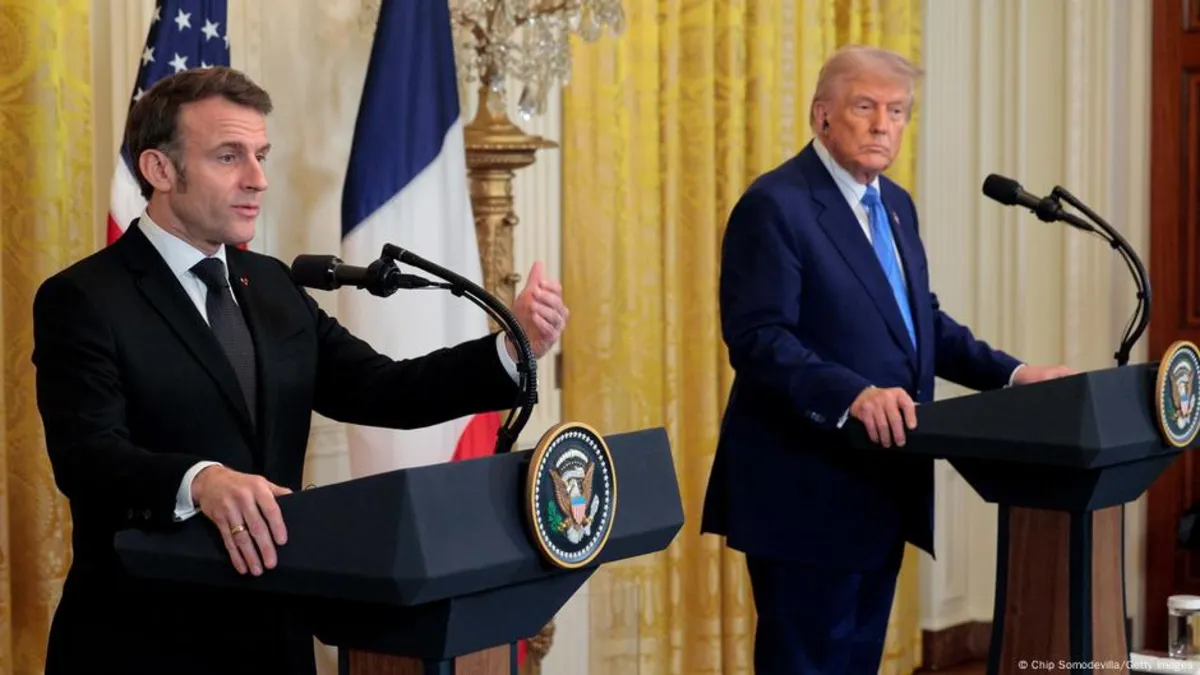
US President Donald Trump expressed optimism on Monday regarding the potential end of Russia's war in Ukraine. This hopeful statement was made during a meeting with French President Emmanuel Macron, coinciding with the third anniversary of Russia's full-scale invasion of Ukraine.
President Emmanuel Macron shared insights into substantial progress from discussions with Trump in Washington, cautioning that any agreement with Moscow must not equate to a surrender for Ukraine. These discussions underscore the deep uncertainty surrounding the future of European and American relations.
France has engaged with the UK regarding the possibility of sending peacekeeping troops as part of security guarantees. Trump indicated that Russian President Vladimir Putin would be amenable to this arrangement. "If we do this deal, he's not looking for more war," Trump assured. However, in a Russian state television interview, Putin suggested the end might not be as imminent as Trump hopes.
Trump expressed hope that the conflict could conclude within weeks, with Ukrainian President Volodymyr Zelenskyy potentially visiting Washington to sign a deal granting the US valuable access to Ukraine's minerals, essential for key technologies.
Macron emphasized the significance of the current moment, stating it could be a turning point in efforts to end the war. "We share your desire to make peace," he remarked, while cautioning that peace should not mean Ukraine's surrender. Macron, previously the last Western leader in contact with Putin post-invasion, hopes Trump's renewed communication with Putin will yield positive results.
A notable rift emerged at the UN General Assembly as the US diverged from European allies, refusing to blame Russia for its invasion. Washington opposed a resolution demanding Russia withdraw troops from Ukraine, opting instead for a UN Security Council resolution acknowledging tragic loss of life without mentioning Kremlin aggression. This resolution, adopted with Russian UN Ambassador Vassily Nebenzia's acknowledgment, marks a notable shift compared to the previous US administration.
Amid mounting battlefield pressures and dwindling US support, several European leaders gathered in Kyiv for commemorative events. European Commission President Ursula von der Leyen highlighted the global implications of the conflict, stressing the importance of deterrence against violations of international borders.
Recent days have seen Trump describe Zelenskyy as a dictator and blame Kyiv for the war, effectively ending Putin's three-year diplomatic isolation by the US. Preparations for a face-to-face meeting between Trump and Putin are reportedly underway, signaling potential shifts in global diplomacy.
On the battlefield, Putin's troops are making steady progress, while Ukraine faces troop and weapon shortages. Meanwhile, EU foreign ministers have approved new sanctions targeting Russia's "shadow fleet" used to circumvent oil and gas transport restrictions. The UK has also imposed sanctions on 107 businesses and individuals, aiming to disrupt Kremlin military supply chains.
UK Prime Minister Keir Starmer, preparing for a visit to Washington, emphasized the importance of Ukrainian voices in peace efforts. Friedrich Merz, potential future German chancellor, reaffirmed Germany's support for Ukraine, advocating for a just peace where the attacked nation is integral to negotiations.
Edited by: Louis Oelofse